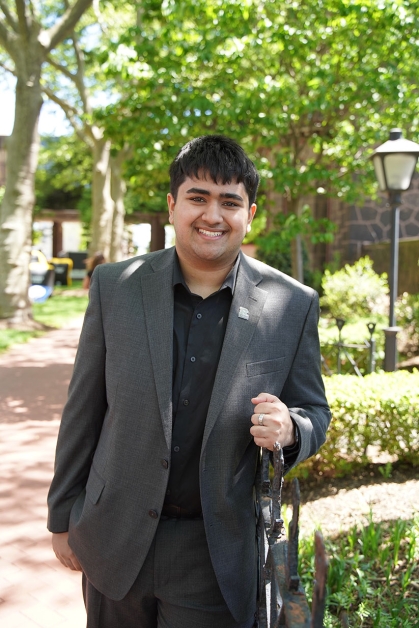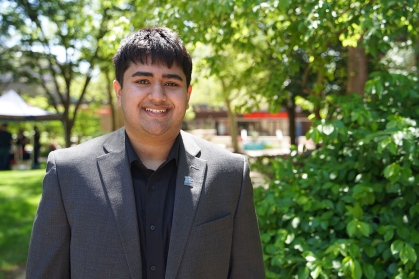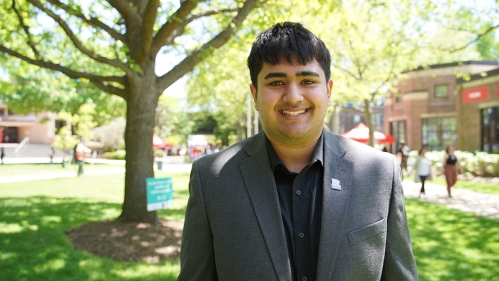It is hard to convey just how much biology major Shaan Mody fit into his three years at Rutgers University–Camden.
The Honors College student has founded and led multiple student organizations, won numerous academic and civic awards, published research, and laid the foundation for student-driven committees to support future Scarlet Raptors.
As he heads to the Rowan-Virtua School of Osteopathic Medicine to complete his medical degree—with a new set of goals and organizations he plans to join—the future physician feels like it was all worth it.
“When people ask me how I did all these things, I always say it's been my passion,” Mody said. “I've always loved helping other people, being involved, and interacting with people, so it never felt like work to me.”

Mody enrolled at Rutgers University–Camden through the BS/DO program, a competitive, accelerated pathway in which students complete three years of undergraduate work before matriculating at Rowan–Virtua’s medical school. The program took the Parsippany native almost two hours away from home.
“Telling people that I was going to Rutgers–Camden was really interesting for me at first because people from North Jersey often go to Newark or New Brunswick,” Mody recalled. “But I can't visualize my undergraduate experience anywhere other than Rutgers–Camden. The tight-knit community here is great. I've made so many connections, and I think those connections extend even beyond what I learned in my classes.”
Mody’s accelerated academic pace was only matched by his student involvement. In his first semester, he co-founded Caring for Camden, a student organization that supports the city’s underserved through outreach opportunities. He joined the university’s Active Minds chapter, a nationwide mental health advocacy group, and helped expand it from a fledgling club to one of Rutgers–Camden’s largest student organizations.
While tutoring with Rutgers–Camden’s Center for Learning and Student Success, Mody established the Emerging Scholars Program, a peer-driven initiative designed to improve retention in the university’s historically most challenging courses. The academic support program fosters group learning, training students for paid positions as tutors and group facilitators. “I have a strong feeling this program will really take off in the coming years—it has the power to transform students into confident leaders and even future educators,” he said.
Mody then collaborated with the Student Wellness Center to form the Student Wellness Advisory Board, which serves as a pipeline for the Rutgers–Camden student body to voice concerns that can be directly met at the Wellness Center. “We created a kind of student government to both hear student feedback and promote the Wellness Center's activities,” he said.
This academic year, Mody extended his campus leadership to the position of vice president with the Student Governing Association (SGA), whose platform aligns with his passion for well-being. “SGA as a whole has focused a lot on improving disability services and ensuring that our campus is accessible for students,” he said. In this role, he championed the university to review its restrooms in academic spaces to better ensure restroom equity, which has led to planned building renovations on campus. He said the SGA has also worked to improve menstrual care access, ensuring every campus restroom is stocked with period products.
Mody knew he wanted to be a doctor since middle school, even homing in on his medical focus a few years later while interning with the New Jersey Pediatric Neuroscience Institute (NJPNI).
“At NJPNI, one of the key things I remember was shadowing a pediatric neurologist, who had this way of interacting with patients that was refreshing because he would slow everything down,” Mody recalled. “Just seeing that connection was so important for me. It made me really want to work with children as well as be in the neurology field.” His first position there was a unique one—in the billing department—as no medical internships were currently available. Undeterred, Mody learned medical billing and eventually worked his way up to a clinical researcher position at the institute, eventually contributing to published studies.

He continued research at Rutgers–Camden, joining the lab of Nir Yakoby, professor in the Department of Biology and head of the Drosophila and Cell Signaling Genetics Research Lab. There, Mody studied how moving DNA enhancers affect genetics and morphology in fruit flies. His work, for which he earned a Chancellor’s Grant for Student Research, advanced his skills in the lab and prepared him for his future in med school.
Mody said he’s excited about continuously learning through medical school and beyond, even considering research outside of a future medical practice inspired by his Rutgers–Camden experience.
“I think the future is uncertain, but I definitely feel very confident about the things that I want to do,” Mody said. “Private practice, research, teaching, gaining a holistic understanding of health care, and being able to give back.”



